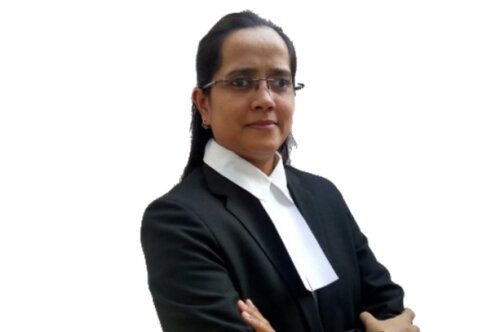Best Military Divorce Lawyers in India
Share your needs with us, get contacted by law firms.
Free. Takes 2 min.
Free Guide to Hiring a Family Lawyer
Or refine your search by selecting a city:
List of the best lawyers in India
About Military Divorce Law in India
Military divorce in India is governed by a combination of civil and military laws. While the grounds for divorce remain the same as for civilians under the Hindu Marriage Act, 1955, or the Special Marriage Act, 1954, specific protocols and considerations apply to military personnel given the unique nature of their service. Matters such as custody, alimony, distribution of marital assets, and retirement benefits require careful consideration, as do issues specific to military regulations and the Armed Forces Tribunal.
Why You May Need a Lawyer
Seeking the guidance of a lawyer is often crucial in military divorce cases for several reasons. Firstly, military families may face unique challenges, such as one spouse being stationed away from the family home, which can complicate settlement procedures. The division of military pensions and benefits often requires specialized knowledge. Furthermore, lawyers can ensure compliance with both civil and military laws, ensuring proper representation before military tribunals and civil courts. A lawyer's expertise is also invaluable in navigating the emotional and procedural complexities that often accompany these cases.
Local Laws Overview
Several key aspects of local laws are particularly relevant to military divorces in India. Military personnel are subject to specific regulations that can influence divorce proceedings, such as residency requirements and the jurisdiction of divorce petitions. The Armed Forces Tribunal also plays a role in legal disputes involving military personnel. Understanding the nuances of how the Hindu Marriage Act or Special Marriage Act interplay with military-specific rules is vital, particularly concerning maintenance, child custody, and the division of service-related benefits.
Frequently Asked Questions
What is a military divorce?
A military divorce refers to the dissolution of a marriage where at least one party is a member of the armed forces, incorporating specific military regulations into standard divorce proceedings.
How does being in the military affect my divorce process?
Military service can affect divorce processes due to factors like jurisdiction, division of benefits specific to the military, and the potential for one spouse's deployment or posting away from their customary residence.
Can a military spouse file for divorce from outside India?
Yes, a military spouse can file for divorce from abroad, but they'll need to comply with jurisdictional requirements and may need to appear in Indian courts in person or through a legal representative.
Does military service affect child custody arrangements?
Yes, factors like parenting time can be influenced by deployments or reassignments, which can necessitate special arrangements or modifications to standard custody agreements.
How are military pensions divided in a divorce?
Military pensions are subject to division upon divorce as a part of marital assets. The exact division depends on the length of the marriage and service overlap, requiring precise legal calculation and settlement.
What are the legal protections for military members in divorce proceedings?
Military members are provided protections like extensions or stays in court proceedings if their service inhibits their ability to engage in legal processes.
What jurisdiction applies to a military divorce?
The jurisdiction depends on various factors, including the servicemember's duty station and the couple's legal domicile. Specific rules might apply based on these combined factors.
Is there legal support for military families facing divorce?
Yes, legal assistance services are available on military bases, offering free consultations and limited help for servicemembers navigating divorce procedures.
How long does it take to finalize a military divorce?
Duration can vary widely, influenced by court schedules, disputes over assets or custody, and compliance with military service-related legal protections.
What is the role of the Armed Forces Tribunal in military divorces?
The Armed Forces Tribunal handles disputes related to service conditions or military rules but doesn’t typically adjudicate divorce, which remains in the civilian court system.
Additional Resources
There are several resources one can turn to for assistance with military divorces in India. The Armed Forces Legal Branch provides some initial guidance. Military support networks and counseling services can offer emotional and logistical support during divorce proceedings. The Directorate of Veterans Affairs can provide information on retirement benefits. It's also advisable to consult with an experienced military divorce lawyer.
Next Steps
If you find yourself in need of legal assistance for a military divorce in India, the first step is to consult with a legal professional who has expertise in military law. Consider reaching out to military legal assistance offices for initial guidance. Prepare all relevant personal and financial documents before consulting a lawyer. Understand your rights and obligations under both civil and military law to aid in making informed decisions. Prioritize the welfare of involved minors and negotiate agreements that will need approval from both the military and civilian courts.
Lawzana helps you find the best lawyers and law firms in India through a curated and pre-screened list of qualified legal professionals. Our platform offers rankings and detailed profiles of attorneys and law firms, allowing you to compare based on practice areas, including Military Divorce, experience, and client feedback.
Each profile includes a description of the firm's areas of practice, client reviews, team members and partners, year of establishment, spoken languages, office locations, contact information, social media presence, and any published articles or resources. Most firms on our platform speak English and are experienced in both local and international legal matters.
Get a quote from top-rated law firms in India — quickly, securely, and without unnecessary hassle.
Disclaimer:
The information provided on this page is for general informational purposes only and does not constitute legal advice. While we strive to ensure the accuracy and relevance of the content, legal information may change over time, and interpretations of the law can vary. You should always consult with a qualified legal professional for advice specific to your situation.
We disclaim all liability for actions taken or not taken based on the content of this page. If you believe any information is incorrect or outdated, please contact us, and we will review and update it where appropriate.
Browse military divorce law firms by city in India
Refine your search by selecting a city.

















